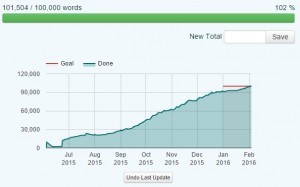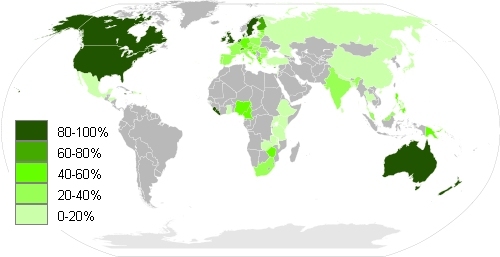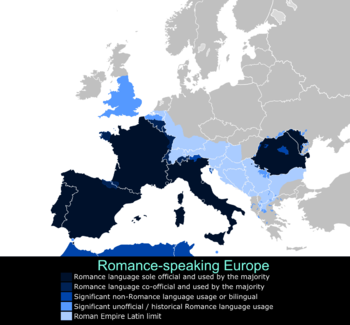Daniel M. Bensen's Blog, page 80
February 2, 2016
DONE!
Junction’s first draft is done.

February 3rd in Sofia, Bulgaria. 101,504 words.
Last line: “Daisuke held Anne’s hand and smiled from his heart.”

January 28, 2016
The future(s) of English(es)
I’m thinking about The Renaissance Express. Like, a lot a lot. And one of the things that bears some thought it the future of the English language.
What will English look like five hundred years hence?
If we compare the future evolution of English to the past, people in the 26th century will speak something about as different from people in the 21st as Early Modern English is to us. That is, a time-traveler from five centuries in the future would be more or less understandable, but would speak with a very strange accent. But strange in what way, exactly?
A lot depends on the history of the future. What countries are most influential and powerful? What populations add themselves into the Anglophone community? How does technology change the way we use our language? The following are several possibilities:
(0) Nobody will speak English
What if the Chinese invade? Or the Arabs? Nahuatl in the 15th century was a great language of trade and culture, after all, and how many people speak it now? Maybe in 500 years we’ll all be speaking some other language, and English will either be the language of a few local underclasses or entirely extinct.
I guess it’s possible, but I doubt it. In the absences of an apocalyptic event that blasts us all back to the stone-age, the winners of the next five hundred years of history will be the people who make the most inventions. The people who make the most inventions will be the people who have the most educated people trying to solve problems. English is the global language of education and invention, and its hard to imagine what other language might replace it. Yes, China and India are very populous, and might well deliver enormous waves of educated inventors, but Chinese and Indian inventors speak English to each other. Of course, they might not speak English in any way familiar to a 21st-century American…
(1) Universal Globish
As many as 100 million people speak English as a foreign language, compared to about 300 million native speakers. It’s easy to imagine that the number of non-native speakers continues to grow until, while most people in the world speak English, few of them speak it as a mother tongue. The language they speak is simpler, more universal, stripped of regional differences, a somewhat artificial language intended only to conduct business and education. English-speakers must learn this new “Globish” in order to communicate with colleagues abroad, but it isn’t that hard.
The problem I have with this scenario is that while there certainly can be (and in fact there is) a pidgin trade-language based on English, it isn’t really universal (speakers of European pidgin English have a hard time understanding speakers of Indian or Chinese pidgins). People could make an effort to create an international standard pidgin, but that language wouldn’t be comprehensible to English speakers. Languages don’t usually form unless the people who speak them have some sense of common identity. People who learn English as a foreign language have no such emotional attachment to the language, and are happy to accept corrections from native English speakers.
So I don’t think the non-native speakers will go off and create a new language. They will probably all converge on a standard dialect. But what will that dialect be?
 (2) “The internet will still be dominated by English speakers, but they’ll have an Indian accent.” Charles Stross said that, and it’s hard to disagree. Once India’s huge population achieves educated middle-class status, their way of speaking English with dominate the global Anglosphere. People in the US or UK might speak local dialects to each other, but the standard dialects of education, wealth, and influence will sound Indian.
(2) “The internet will still be dominated by English speakers, but they’ll have an Indian accent.” Charles Stross said that, and it’s hard to disagree. Once India’s huge population achieves educated middle-class status, their way of speaking English with dominate the global Anglosphere. People in the US or UK might speak local dialects to each other, but the standard dialects of education, wealth, and influence will sound Indian.
My problem with this scenario is that although many people in India speak English, very very few (0.022%) speak it as a mother tongue. When India becomes a world power (and I don’t doubt that it will), we might very well see an international rise in the popularity of Hindi, but Indian English might not have any more influence than other English dialects than Anglo-Norman had on other dialects of French.
(3) English in the 26th century might look like like Latin in the 10th century and like Arabic in the 21st. There is an international standard English based on some classic works (like the Kage Baker’s “Cinema Standard“), but different groups of people will be speaking increasingly incomprehensible dialects in local and informal situations.
The problem with this prediction is it actually bucks a trend we’ve been seeing since the invention of the radio, which is a decline in differences between regional dialects. There are some exceptions, but generally people are now in better communication than ever before, and their dialects are merging. This is true even for the two most influential English dialects (British Received Pronunciation and General American), which are actually growing together, not apart.
(4) Universal translators make everything irrelevant.
One interesting new wrinkle technology will introduce is machine translation. Even if we never get any better at machine translation than we are now, people will easily be able to “re-tune” materials in a foreign dialect into their own. We already do something similar with British books published in the US (a simple word search that replaces “lift” with “elevator” and “dustbin” with “garbage can”).
If everyone uses technology to filter out foreign dialects, we could see a combination of all the scenarios above, where speakers of increasingly divergent “home languages” speak to each other in a simple, machine-assisted international standard based on the norms of Indian programmers.
Or something completely different. What do you think will happen to English in the next five hundred years?

January 27, 2016
Yes, Your Velociraptors Must Have Feathers and Other Concessions to Reality
From Love in a Time of Chasmosaurs
Universal Studios had a good reason for using giant lizards rather than real dinosaurs in Jurassic World. They didn’t want to make just any old dinosaur movie, they wanted to continue the Jurassic Park franchise, and Jurassic Park raptors look like this. If the special effects people made raptors that look like that, they would have been off-brand—unrecognizable to the public, and (since you can’t copyright what a real animal looks like) terrifyingly public domain. Even worse, a real Velociraptor wouldn’t have worked symbolically. The movie doesn’t need a real animal. It needs a key to the lock in your brain that opens a door marked “here be dragons.”

January 26, 2016
My Favorite Bit with Mary Robinette Kowal
What would it be like to meet a tyrannosaur? That’s the question that everyone who works with dinosaurs wants to answer. What did this animal look like? How did it behave? What sounds did it make? What smells? How did it fit into its landscape? Answering those questions —and a surprising number of those questions do have answers — will give you a picture of an animal.

(Tyrannosaurus rex by Daniel M Bensen)
But, here’s another question: Why are you meeting a tyrannosaur? What are you doing in the late Cretaceous? What are you going to do if that thing attacks? How the hell are you going to survive this? Answering those questions will give you a story.

January 21, 2016
How Dinosaurs can fix your Flower Garden
A museum worker I follow once commented on the kids who come up to him and asked to be directed to the “dinosaur plants.” Adorable. Can’t you just picture that dinosaur plant, spiky and gnarled, primeval mists dripping off its scaled fruit as it uncoils its fronds into the steaming jungle? Or, you might imagine cycads and dawn redwoods, monkey-puzzle trees or ferns or gingkoes. But flowers? Heck no! Dinosaurs were big and mean. They ate big mean plants, not tender daisies! Well, it depends on what time and place you’re talking about, but the home ofTyrannosauus and Triceratops, the setting for my novel (http://www.amazon.com/Groom-Tyrannosaur-Queen-time-travel-romance-ebook/dp/B018UD6DH2 ) was just crawling with flowers.

The lazy hero
This is a response/continuation of a request posted on tumblr:
“what I want to see is a story in which the practical dedicated young warrior receives a prophecy that one day they’re going to save the world from great evil and uses it as an excuse to do whatever the hell they want for the rest of the story”
I invite you to imagine that hero surrounded by all the secretaries and underlings and bureaucrats of the priesthood, struggling to make sure that the prophecy they made up actually comes to pass.
“Your holiness, the Chosen One turned out to be a lazy asshole after we, uh, chose him. Can we please just kill him and start over?”
(sigh) “No, too many people have seen the idiot’s face. Remind me to put a mask on the next Chosen One. You can put a mask on anyone.”
“We actually have found someone who resembles the Chosen One, your holiness. The problem is that he’s an ignorant farm-boy with no skills. We’d have to train him up from nothing in mere months.”
“He’ll be hacked apart on the battle-field…unless we use zombies. Zombie soldiers are even more useless on the battlefield than peasants.”
“And he’ll have a reason to want to keep one of us around. Otherwise he’ll be totally lost.”
“I don’t know, though. A peasant? The Chosen One is supposed to rule the kingdom after all.”
“Well, we could put it about that he’s the long lost son of someone or other.”
“Who? Nobody’s going to recognize some jumped up swine-herd as their heir…unless…What if we say Lord Awful was the kid’s father? The heretic isn’t going to be in a position to argue, once our boy kills him.”
“Good idea, your holiness!”
“Course it’s a good idea! Now get cracking! We need to get someone burying caches of mystical artifacts post haste!”

January 20, 2016
How dinosaurs can fix your Marriage
My agent gave me a wonderful rule for romantic plots: “Make sure the partners in the relationship deserve each other.”
Unless your book is very short, your lovers don’t get together immediately. They might like or be attracted to each other from their first meeting, but there has to be a reason why there’s a whole book between “A meets B” and “they lived happily every after.”

January 14, 2016
How Dinosaurs can fix your need for speed
I self-published Groom of the Tyrannosaur Queen on the first of January, but before that, the book sat in my trunk for two and a half years. In the last editing-run through I did in preparation for publishing, I was expecting (dare I say “hoping”) to find that the two books I’d written since had taught me something. I hoped I would find big fat rookie mistakes to fix. I did, but I also found some scenes that were really good. Better, in fact, than anything in my subsequent books. There are scenes in Tyrannosaur Queen where there isn’t much action going on, the plot isn’t moving, and we’re not learning about the characters. We’re just watching a velociraptor hunt or a quetzalcoatlus fly or a tyrannosaur stand in the rain. In my later books, I knew more about how to efficiently craft a story, but I had apparently forgotten how to stop and smell the dinosaurs.

January 11, 2016
How dinosaurs can fix your Writing Routine
I wrote my newest book, Groom of the Tyrannosaur Queen, while my wife was pregnant, and by the time I got around to publishing it, I had two daughters, 3 years two months old, respectively. Needless to say, my work habits suffered many changes in this harsh environment, but like small mammals at the end of the Mesozoic, anything left must be pretty good at surviving. If your house is inhabited by shrieking children (or something as distracting, such as war-cyborgs or velociraptors), you might appreciate some of the writing habits I’ve evolved.
Read the rest on Rebecca Roland’s blog
More How Dinosaurs can fix your…esssays

January 8, 2016
How Dinosaurs can fix your Time Machine
You know what I hate about time travel? Time travel tropes. Oh no, the future is the past and the past is the future! It turns out that by trying to prevent the thing, you caused the thing! The 1983 you went to doesn’t exist anymore! Now you have to seduce your own grandmother and kill your grandfather, clearly.
I didn’t want to write a book about time machines any more than George Miller wanted to write about cars. I wanted to write a book about bad-asses riding dinosaurs. So here’s how I worked it. And the science might even make sense.
Read the rest on Beth Cato’s blog!






